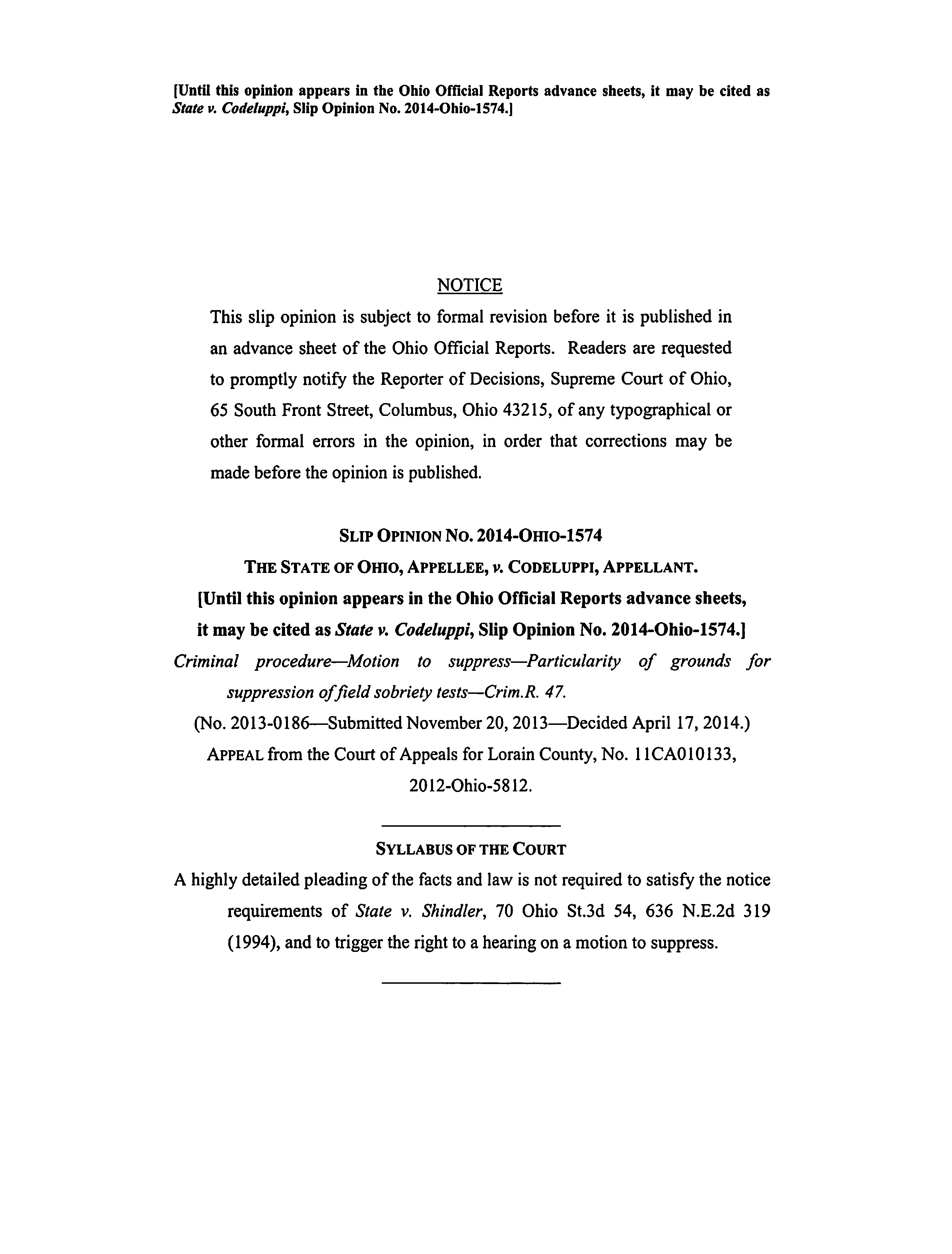 Two days ago, the Ohio Supreme Court issued a decision clarifying how specific a motion to suppress must be for the defendant to receive an evidentiary hearing on the motion. In State v. Codeluppi (2014), the Court concluded: “[A] highly detailed pleading of the facts and law is not required to satisfy the Shindler notice requirements and to trigger the right to a hearing on the motion to suppress.” This conclusion affirmed the Court’s decision from a decade ago in State v. Shindler (1994). The Codeluppi decision hopefully will end uncertainty about the specificity required for motions to suppress in Ohio DUI/OVI cases.
Two days ago, the Ohio Supreme Court issued a decision clarifying how specific a motion to suppress must be for the defendant to receive an evidentiary hearing on the motion. In State v. Codeluppi (2014), the Court concluded: “[A] highly detailed pleading of the facts and law is not required to satisfy the Shindler notice requirements and to trigger the right to a hearing on the motion to suppress.” This conclusion affirmed the Court’s decision from a decade ago in State v. Shindler (1994). The Codeluppi decision hopefully will end uncertainty about the specificity required for motions to suppress in Ohio DUI/OVI cases.
Drive High – Get A DUI
In January, Colorado became the first state to legalize recreational marijuana. In March, Colorado became the first state to televise entertaining public service announcements about the danger of driving under the influence of marijuana. The commercials are part of the Colorado Department of Transportation’s new campaign: “Drive High, Get A DUI“. 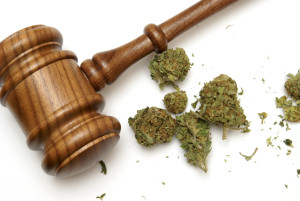 Although Colorado is one of only two states to legalize recreational marijuana, it is not the only state to criminalize operation of a vehicle under the influence of marijuana. Contrasting Colorado’s handling of DUI marijuana with that of Ohio illustrates the deficiencies in Ohio’s approach.
Although Colorado is one of only two states to legalize recreational marijuana, it is not the only state to criminalize operation of a vehicle under the influence of marijuana. Contrasting Colorado’s handling of DUI marijuana with that of Ohio illustrates the deficiencies in Ohio’s approach.
What You Need To Know If You Handle DUI/OVI Cases
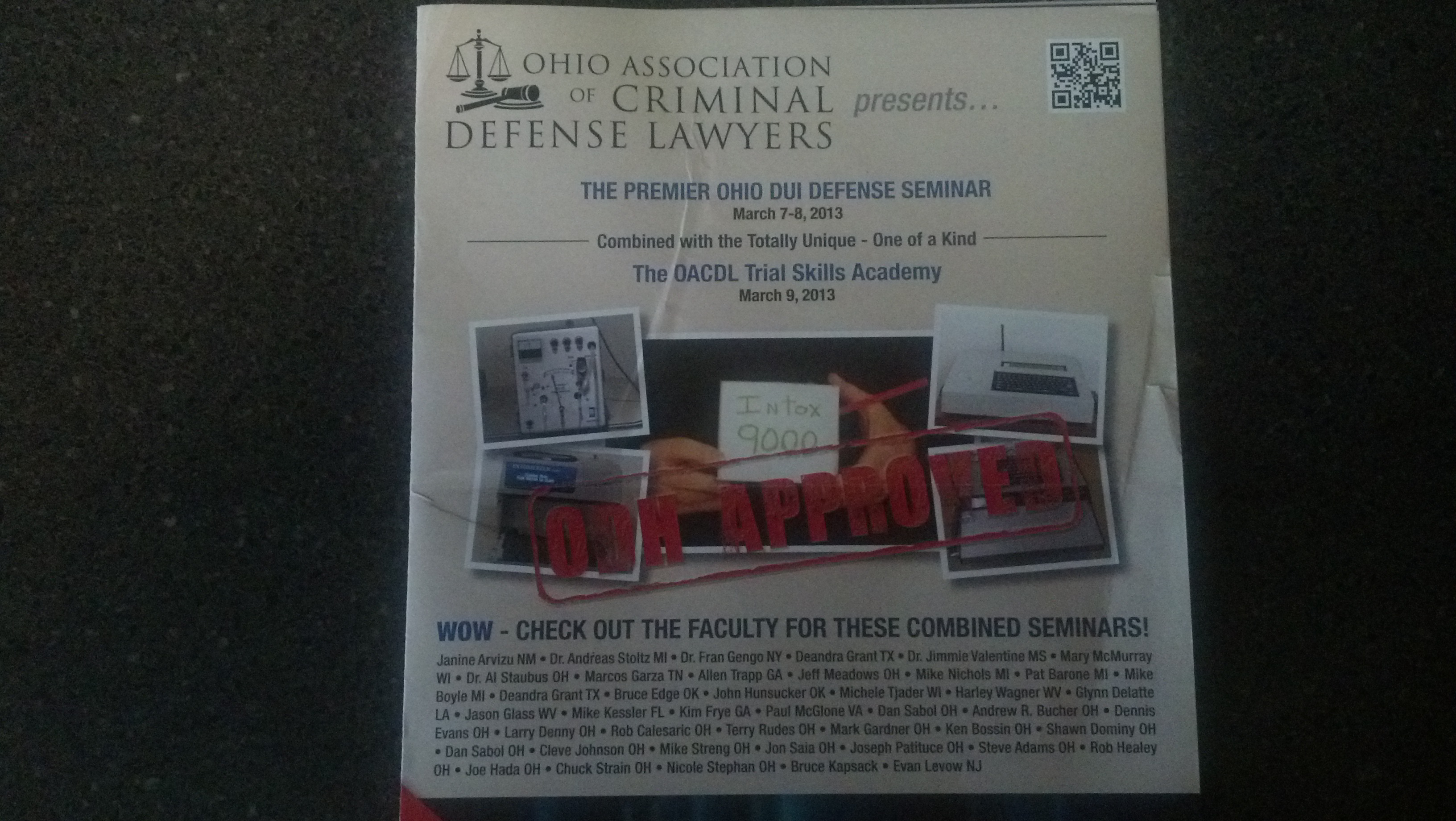 Last week was the annual DUI/OVI seminar hosted by the Ohio Association of Criminal Defense Lawyers (OACDL). The three-day seminar, held at the Westin in downtown Columbus, has become nationally recognized and is one of the few state seminars approved for credit from the National College for DUI Defense (NCDD). The theme of this year’s seminar was ‘what you need to know if you handle DUI/OVI cases’. There is a lot a lawyer needs to know, so the conference did not deal with substantive law: cases, statutes, and regulations. Instead, outstanding lawyers and experts from across the country taught about science, litigation, and presentation.
Last week was the annual DUI/OVI seminar hosted by the Ohio Association of Criminal Defense Lawyers (OACDL). The three-day seminar, held at the Westin in downtown Columbus, has become nationally recognized and is one of the few state seminars approved for credit from the National College for DUI Defense (NCDD). The theme of this year’s seminar was ‘what you need to know if you handle DUI/OVI cases’. There is a lot a lawyer needs to know, so the conference did not deal with substantive law: cases, statutes, and regulations. Instead, outstanding lawyers and experts from across the country taught about science, litigation, and presentation.
Court Concludes Traffic Stop Was Not Justified By Visual Speed Measurement In Ohio DUI/OVI Case
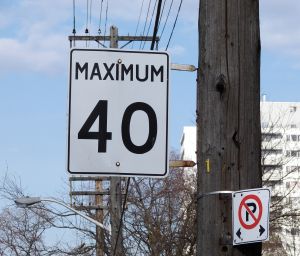 In most Ohio DUI/OVI cases, the evidence includes police officer testimony and police cruiser video. Officer testimony is sometimes not corroborated by the recording from the cruiser video. In such a situation, a judge or jury has to decide if they believe the officer or their own eyes. Such a situation arose in the recent case of State v. Jarosz, and the judges believed their eyes.
In most Ohio DUI/OVI cases, the evidence includes police officer testimony and police cruiser video. Officer testimony is sometimes not corroborated by the recording from the cruiser video. In such a situation, a judge or jury has to decide if they believe the officer or their own eyes. Such a situation arose in the recent case of State v. Jarosz, and the judges believed their eyes.
When Can Officers Stop Drivers Based On An Anonymous Tip?
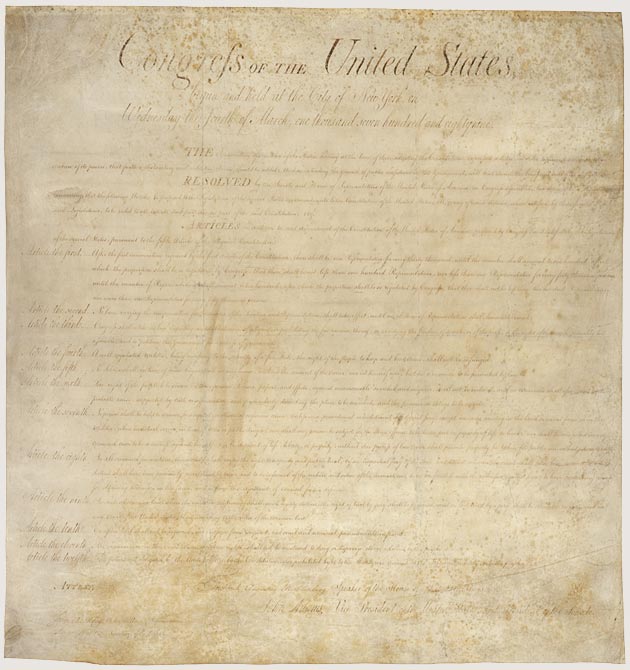 The caller was anonymous, and there was little evidence corroborating the caller’s claim. He or she called 9-1-1 and reported she was driving southbound on Highway 1 and was just run off the road. The caller described a silver Ford F150 truck with a California license plate. It did not take long before officers spotted a silver F150 and pull it over based on the anonymous caller’s report. After stopping the truck, the officers ended up finding and seizing marijuana. The question is whether this stop was lawful.
The caller was anonymous, and there was little evidence corroborating the caller’s claim. He or she called 9-1-1 and reported she was driving southbound on Highway 1 and was just run off the road. The caller described a silver Ford F150 truck with a California license plate. It did not take long before officers spotted a silver F150 and pull it over based on the anonymous caller’s report. After stopping the truck, the officers ended up finding and seizing marijuana. The question is whether this stop was lawful.
Should We Use Interlock Instead Of License Suspensions For Ohio DUI/OVI Sentences?
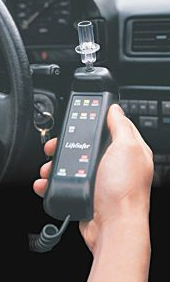
An Ohio DUI / OVI sentence has several parts. There is mandatory jail time (or a driver intervention program for a first offense), a mandatory fine, and a mandatory license suspension. For a first offense, the license suspension is a minimum of six months and a maximum of three years, and the judge has discretion to grant or deny limited driving privileges. There are also optional sanctions for a first offense, and one of those sanctions is the use of an ignition interlock device. Proposed legislation in New Jersey would replace mandatory license suspensions with mandatory use of an ignition interlock. Should Ohio consider this change?
Modern Scarlet Letter: Ohio’s DUI / OVI Habitual Offender Registry
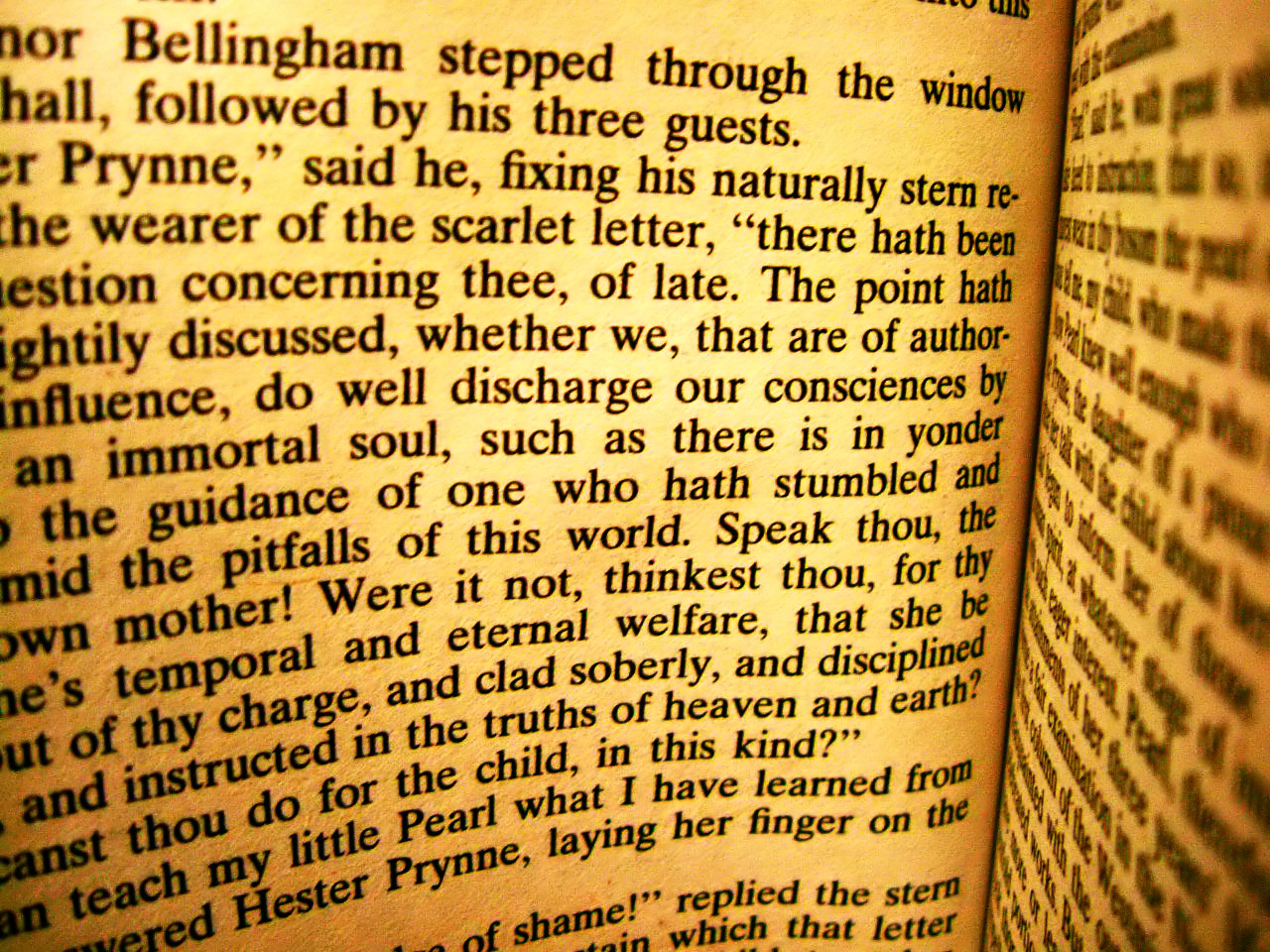
Someone who has multiple conviction for DUI (called OVI in Ohio) faces increasingly severe consequences with each conviction. For example, while a first OVI typically results in three days in a hotel at a driver intervention program, a third offense with a high test or test refusal is a mandatory minimum of 60 days in jail. Ohio’s OVI sentencing law recognizes that a first offense may be an isolated incident, but a third offense is something more. If a person gets to the point of having five OVI convictions, that person is supposed to be listed in a registry of habitual OVI offenders.
Should DUI / OVI Laws Apply To Golf Carts?
 It’s January in central Ohio, and the temperature is slightly above zero. It’s not exactly golfing weather, and at this time of year, I begin to wonder if we will ever see golfing weather again. It’s not the time of year we think about using golf carts, and most of us are not pondering whether people should be convicted of DUI/OVI for driving a golf cart under the influence. I am, because I recently resolved a case where my client was charged with a golf cart OVI in Columbus, Ohio.
It’s January in central Ohio, and the temperature is slightly above zero. It’s not exactly golfing weather, and at this time of year, I begin to wonder if we will ever see golfing weather again. It’s not the time of year we think about using golf carts, and most of us are not pondering whether people should be convicted of DUI/OVI for driving a golf cart under the influence. I am, because I recently resolved a case where my client was charged with a golf cart OVI in Columbus, Ohio.
Driving With A Hangover: As Dangerous As Driving Drunk?
 Everyone knows that driving under the influence of alcohol is dangerous. It impairs our vision, increases our reaction time, and makes it challenging to estimate the distance between us and other drivers or objects on the road. Few people, however, consider the danger of driving under the influence of a hangover the day after a night of heavy drinking. Most people think, ‘the alcohol level in my blood is lower than the legal limit, so it is safe to drive’. Think again. Two recent studies have shown that driving with a hangover is nearly as dangerous as driving under the influence of alcohol.
Everyone knows that driving under the influence of alcohol is dangerous. It impairs our vision, increases our reaction time, and makes it challenging to estimate the distance between us and other drivers or objects on the road. Few people, however, consider the danger of driving under the influence of a hangover the day after a night of heavy drinking. Most people think, ‘the alcohol level in my blood is lower than the legal limit, so it is safe to drive’. Think again. Two recent studies have shown that driving with a hangover is nearly as dangerous as driving under the influence of alcohol.
Is Ohio’s Implied Consent Law For DUI/OVI Unconstitutional?
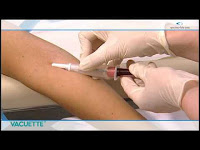
A recent vehicular homicide case in Wisconsin triggers the question of whether Ohio’s implied consent law is constitutional. In that case, a former Lutheran bishop is accused of what Ohio calls Aggravated Vehicular Homicide; causing the death of another person by operating a vehicle under the influence. The bishop was told that he would lose his license if he did not consent to a blood test, so he submitted to the test. His attorney argued that the threat of a license suspension amounts to coercion, and that makes the implied consent law unconstitutional. In Ohio, this issue has been decided.
 Columbus OVI/DUI Attorney Blog
Columbus OVI/DUI Attorney Blog

